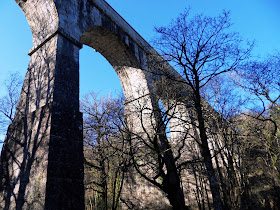▼
Friday, 31 January 2020
The Luxulyan Valley Cornwall
An interesting place to walk in Cornwall is the Luxulyan Valley, even if it can be a touch cold in winter - icicles above! It is considered to be somewhere of natural beauty.
One of it's attractions for me is the 100 feet high viaduct which is also an aqueduct. It has 10 arches made of Cornish granite and stretches for some 650 feet in length.
We scrambled up the valley side to reach the top of the aqueduct. The 'roadway' across appears to have a surface of solid granite slabs but, as you walk across, there are gaps in the slabs and it can be seen that there is water running across the viaduct.
To give a little of the history of Luxulyan Valley it was once known for the production of granite and industrial minerals. This was during the 19th century.
The impressive viaduct was dreamed up by the imagination of Joseph Treffry. Between the 1820s and his death in 1850 Treffry's buildings, tramways, viaduct and leats transformed the valley into an area of industrial activity.
The valley became a centre for granite quarrying, copper and tin mining and also china clay and stone production.
Times have now moved on and we are left with a lovely area for walking.
Water seems to be flowing everywhere along leats. A leat being an artificial waterway or aqueduct made for supplying water to industry.
In 2006 the valley's copper mining association led it to being inscribed as part of the Cornwall and West Devon Mining Landscape World Heritage.
All in all an interesting place to walk ...
… a final look at the Luxulyan viaduct.
For a good sized map of the valley by The Friends of Luxulyan Valley please click here.
For another valley walk with a viaduct and 33 photos go to: 33 Photos: A Circular Walk Based On Gover Valley, St.Austell, Cornwall













Beautiful! Walking through here must be like walking through history.
ReplyDeleteHello Trish, thank you. An interesting place to walk, makes a change from beaches!
DeleteImpressive structure,great to be able to walk with views above the trees.
ReplyDeleteThanks David, It's one of the few viaducts we can walk across in Cornwall. In the 1880s it was used as a road across the valley and also for a small train. One of the leats keeps the small port at Charlestown topped up with water.
Delete